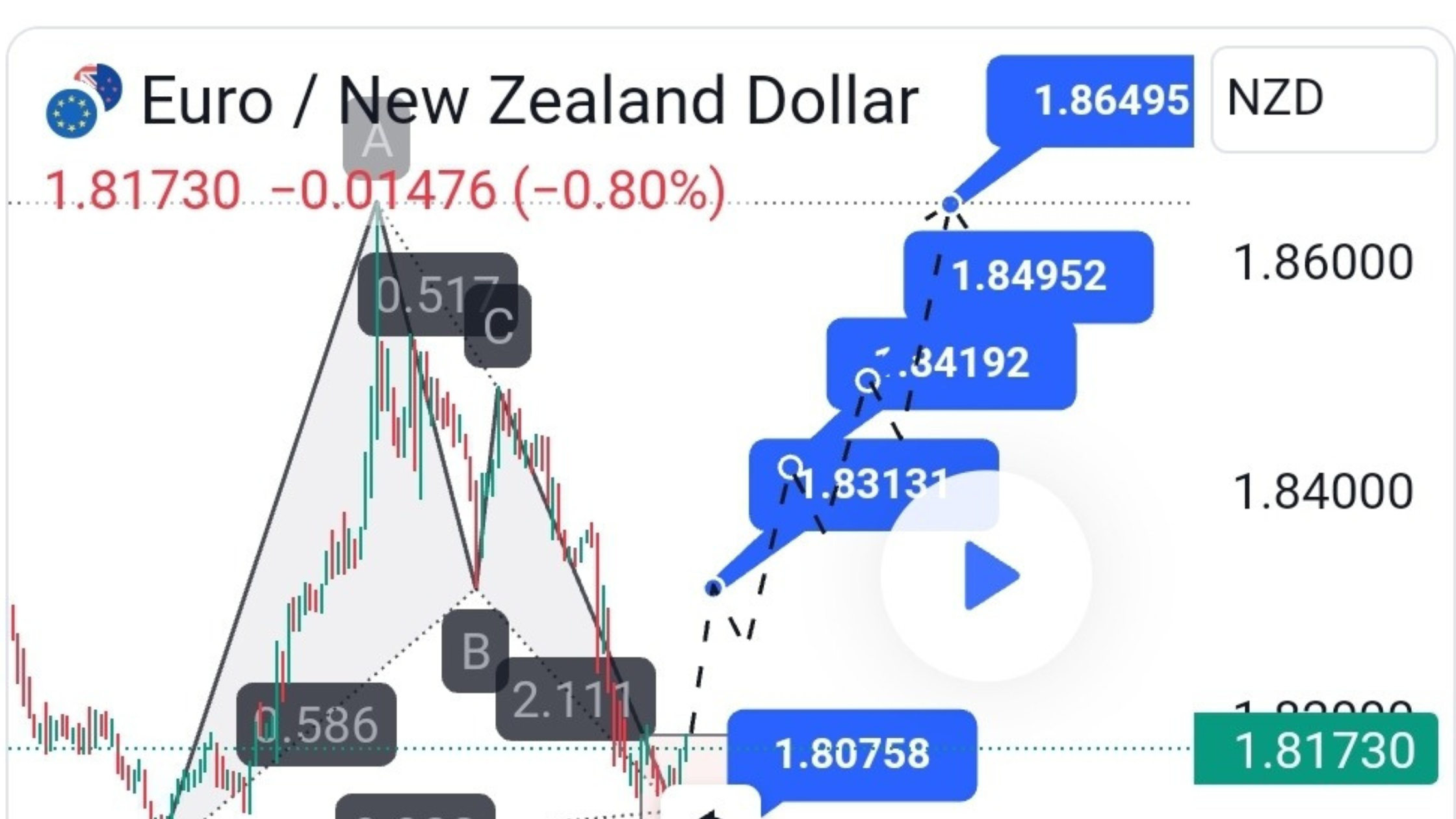Forex trading is a highly volatile venture. Thus, identifying and capitalizing on high-probability trading opportunities is crucial. One such opportunity currently presents itself in the EURNZD currency pair, thanks to a textbook Bullish Bat pattern that has formed on the chart. Here’s a comprehensive analysis of this setup and a detailed trading plan to maximize potential gains.
Understanding the Bullish Bat Pattern
The Bullish Bat is a harmonic pattern that signals a potential bullish reversal after a downtrend. It is characterized by specific Fibonacci retracement levels that define its structure. This pattern is highly regarded among traders for its reliability and precise entry points.
Key Elements of the EURNZD Bullish Bat
- Completion Point: The Bullish Bat pattern on the EURNZD pair reaches its completion at point D, which is approximately at the 1.81178 level. This is where the potential reversal is anticipated to occur.
- Potential Reversal Zone (PRZ): The PRZ is a critical area where traders look for signs of a reversal. For the EURNZD pair, the PRZ spans about 100 pips, ranging from 1.8185 to 1.80758. This zone is where long positions can be considered in anticipation of a bullish reversal.
- Target Levels: After a successful reversal, the target levels for the EURNZD are as follows:
- T1: 1.83131
- T2: 1.84192
- T3: 1.84952
- Extended Target (T4): 1.86495
These targets are based on Fibonacci extensions and previous support and resistance levels.
- Entry Strategy: To confirm the breakout and ensure a higher probability of success, I am looking for a solid market support and a breakout above the 1.81849 price region. This confirmation is crucial before entering a long position.
- Invalidation Point: It’s essential to have a clear invalidation level to manage risk effectively. For this trade idea, a break and close below 1.80758 would invalidate the Bullish Bat pattern and the associated long trade setup.
Detailed Trade Plan
Step 1: Analyze the Market Conditions
Before entering any trade, it’s vital to analyze the overall market conditions. This includes examining the broader economic context, central bank policies, and geopolitical factors that could influence the EURNZD pair. Currently, the Eurozone and New Zealand economies are experiencing various factors that could impact their respective currencies. Staying updated with economic news and market sentiment is crucial.
Step 2: Confirm the Bullish Reversal
The completion of the Bullish Bat pattern at 1.81178 is a strong signal, but additional confirmation is needed. Look for bullish candlestick patterns, such as a bullish engulfing or a morning star, within the PRZ. Also, monitor volume indicators to ensure there is sufficient buying interest.
Step 3: Set Entry and Stop-Loss Orders
- Entry: Place a buy order slightly above the 1.81849 level. This ensures that the breakout is confirmed, reducing the risk of a false breakout.
- Stop-Loss: Set a stop-loss order just below the PRZ at 1.80758. This helps in managing risk by limiting potential losses if the trade doesn’t go as planned.
Step 4: Define Target Levels
Once the trade is active, define the target levels as follows:
- Target 1 (T1): 1.83131
- Target 2 (T2): 1.84192
- Target 3 (T3): 1.84952
- Extended Target (T4): 1.86495
Consider scaling out of the position at each target level to lock in profits while allowing the remaining position to capture further gains.
Step 5: Monitor and Adjust
Regularly monitor the trade and be prepared to adjust the stop-loss and take-profit levels based on market conditions. Trailing stop-loss orders can be used to protect profits as the trade progresses towards higher targets.
Conclusion
The Bullish Bat pattern on the EURNZD pair presents a compelling trading opportunity with a favorable risk-reward ratio. By adhering to a disciplined trading plan and utilizing proper risk management techniques, traders can maximize their chances of success. However, it’s essential to remember that no trade is guaranteed, and managing risk is paramount.
This analysis and trade idea are for educational purposes only and should not be considered financial advice. Always conduct your own research and consult with a financial advisor before making any trading decisions.
